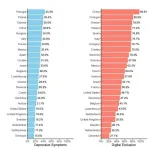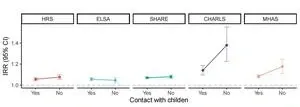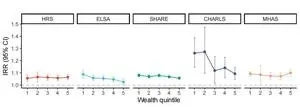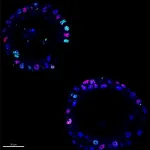Digital Exclusion Increases Risk of Depression Among Older Adults Across 24 Countries
2025-03-12
(Press-News.org)
Older adults who lack internet access are at a significantly higher risk of developing depressive symptoms, especially those with limited familial support or lower income levels, according to a new study published in Health Data Science. Conducted by an international team of researchers, this study analyzed data from five major aging cohort studies covering 24 countries, revealing a strong link between digital exclusion and mental health.
The researchers, led by Dr. Yinzi Jin from Peking University, investigated how digital exclusion—defined as the lack of internet access—affects the mental health of older adults. Using data from the Health and Retirement Study (HRS), the English Longitudinal Study of Aging (ELSA), the Survey of Health, Ageing and Retirement in Europe (SHARE), the China Health and Retirement Longitudinal Study (CHARLS), and the Mexican Health and Aging Study (MHAS), they examined trends from 2010 to 2018 among 122,242 participants.
Their findings indicate that digital exclusion is widespread among older adults, with prevalence rates ranging from 21.1% in Denmark to 96.9% in China. More crucially, digitally excluded older adults exhibited a significantly higher likelihood of experiencing depressive symptoms across all studied cohorts. The association remained robust even after adjusting for demographic and socioeconomic factors such as age, gender, retirement status, education, household wealth, social activities, and regular contact with children.
The impact of digital exclusion was found to be most pronounced among two vulnerable groups: individuals with infrequent contact with their children and those in lower wealth quintiles. Among participants who did not maintain regular weekly contact with their children, the negative effect of digital exclusion on mental health was particularly strong. Similarly, older adults in the lowest wealth quintiles were disproportionately affected, with the most significant association observed in the CHARLS cohort in China.
"Our study highlights a pressing public health concern—older adults who lack digital access are at greater risk of depression, particularly if they also face social isolation or financial difficulties," said co-author Dr. Jingjing Wang. "Bridging the digital divide should be a priority to improve mental well-being among aging populations."
The study underscores the importance of digital inclusion as a means to enhance the mental health and quality of life for older adults. The authors advocate for policies that promote internet access and digital literacy among seniors, particularly in low- and middle-income countries, where digital exclusion remains most pervasive.
"Ensuring equitable access to digital technologies is not just a technological issue but a crucial component of social well-being and mental health support for the elderly," added Dr. Yinzi Jin. "Future interventions should focus on making digital tools more accessible, affordable, and user-friendly for aging populations."
As digitalization continues to shape social interactions and access to resources, the study calls for coordinated efforts from governments, community organizations, and families to integrate older adults into the digital world. The researchers stress that addressing digital exclusion is not only a matter of convenience but a critical step toward improving mental health outcomes for the elderly worldwide.
The full study is available in Health Data Science. https://spj.science.org/doi/10.34133/hds.0218
END
ELSE PRESS RELEASES FROM THIS DATE:
2025-03-12
Quantum annealing processors outperform classical supercomputers in solving real-world scientific simulations of quantum spin dynamics, researchers report in a new study, achieving results far beyond the capacity of conventional computational methods, which may require impossible time and energy to match. The results provide a challenge to classical computing, where method improvement has in the past tempered claims of quantum advantage. Only in recent years have quantum computers begun to live up to their lofty promises, with quantum processing units (QPUs) with diverse architectures – such as photonic, neutral-atom, and ...
2025-03-12
How UV Radiation Triggers a Cellular Rescue Mission
Ultraviolet (UV) radiation from the sun is a well-known cause of DNA damage, which can lead to diseases like skin cancer. But how do our cells repair this damage to protect us? Researchers from Sabanci University, Veysel Oğulcan Kaya and Ogün Adebali, have uncovered a fascinating answer: when DNA is damaged by UV light, our cells reorganize their genetic material in 3D space to prioritize repair, in what might be called a “cellular rescue mission.”
A New Look at DNA Repair
DNA, the blueprint of ...
2025-03-12
Until now, doctors knew hepatic stellate cells mainly as drivers of liver fibrosis. The actual functions of this cell type have hardly been studied to date. Researchers from the German Cancer Research Center (DKFZ), the Mannheim Medical Faculty and Columbia University in New York have now published in the journal Nature that hepatic stellate cells control liver metabolism as well as liver regeneration and size. The results of the study could contribute to new therapeutic approaches for liver diseases.
The liver is a central organ for carbohydrate and protein metabolism as well as for the detoxification ...
2025-03-12
Pancreatic cancer is one of the deadliest cancers worldwide, with a five-year survival rate of 13%. This poor prognosis stems from both late detection and the cancer’s notorious capacity to adapt and resist therapy. Now, a study led by researchers at the University of Verona, University of Glasgow, and the Botton-Champalimaud Pancreatic Cancer Centre uncovers a hidden driver of this adaptability: extrachromosomal DNA (ecDNA).
A New Player in Pancreatic Cancer
The team found that some pancreatic cancer cells gain a major survival edge by carrying copies of critical cancer genes—such as ...
2025-03-12
Since the groundbreaking discovery of graphene in 2004, the dizzying pace of progress in two-dimensional (2D) materials has ushered in a new era of fundamental research and technological innovation. Although nearly 2,000 2D materials have been theoretically predicted and hundreds have been created in laboratory settings, most of these 2D materials are limited to van der Waals (vdW) layered crystals.
Scientists have long been keen to develop atomically thin 2D metals, thereby expanding ...
2025-03-12
MIS-C is a serious inflammatory shock that affects children. It can occur several weeks after a COVID infection and can be life-threatening. Until now, however, the precise cause of the condition was unknown. Researchers at Charité – Universitätsmedizin Berlin and the German Rheumatology Research Center (DRFZ), an institute of the Leibniz Association, have identified that reactivation of a pre-existing, dormant infection with the Epstein-Barr virus triggers an excessive inflammatory response. The researchers have detailed their findings in an article in Nature.* These insights open the door to new treatment methods, potentially not limited to MIS-C.
The majority of children ...
2025-03-12
Delft, The Netherlands: Quantum Internet Alliance (QIA) researchers at TU Delft, QuTech, University of Innsbruck, INRIA and CNRS recently announced the creation of the first operating system designed for quantum networks: QNodeOS. The research, published in Nature, marks a major step forward in transforming quantum networking from a theoretical concept to a practical technology that could revolutionize the future of the internet.
“The goal of our research is to bring quantum network technology to all. With QNodeOS we're taking a big step forward. We're making it possible – ...
2025-03-12
Our brains use basic ‘building blocks’ of information to keep track of how people interact, enabling us to navigate complex social interactions, finds a new study led by University College London (UCL) researchers.
For the study, published in Nature, the researchers scanned the brains of participants who were playing a simple game involving a teammate and two opponents, to see how their brains were able to keep track of information about the group of players.
The scientists found that rather ...
2025-03-12
ANN ARBOR—Large, undisturbed forests are better for harboring biodiversity than fragmented landscapes, according to University of Michigan research.
Ecologists agree that habitat loss and the fragmentation of forests reduces biodiversity in the remaining fragments. But ecologists don't agree whether it's better to focus on preserving many smaller, fragmented tracts of land or larger, continuous landscapes. The study, published in Nature and led by U-M ecologist Thiago Gonçalves-Souza, comes to a conclusion on the decades-long debate.
"Fragmentation is bad," said study author Nate Sanders, U-M professor of ecology and evolutionary biology. ...
2025-03-12
Modern communication networks rely on optical signals to transfer vast amounts of data. But just like a weak radio signal, these optical signals need to be amplified to travel long distances without losing information. The most common amplifiers, erbium-doped fiber amplifiers (EDFAs), have served this purpose for decades, enabling longer transmission distances without the need for frequent signal regeneration. However, they operate within a limited spectral bandwidth, restricting the expansion of optical networks.
To meet the growing demand for high-speed data transmission, researchers have been seeking ways to develop more powerful, flexible, ...
LAST 30 PRESS RELEASES:
[Press-News.org] Digital Exclusion Increases Risk of Depression Among Older Adults Across 24 Countries






